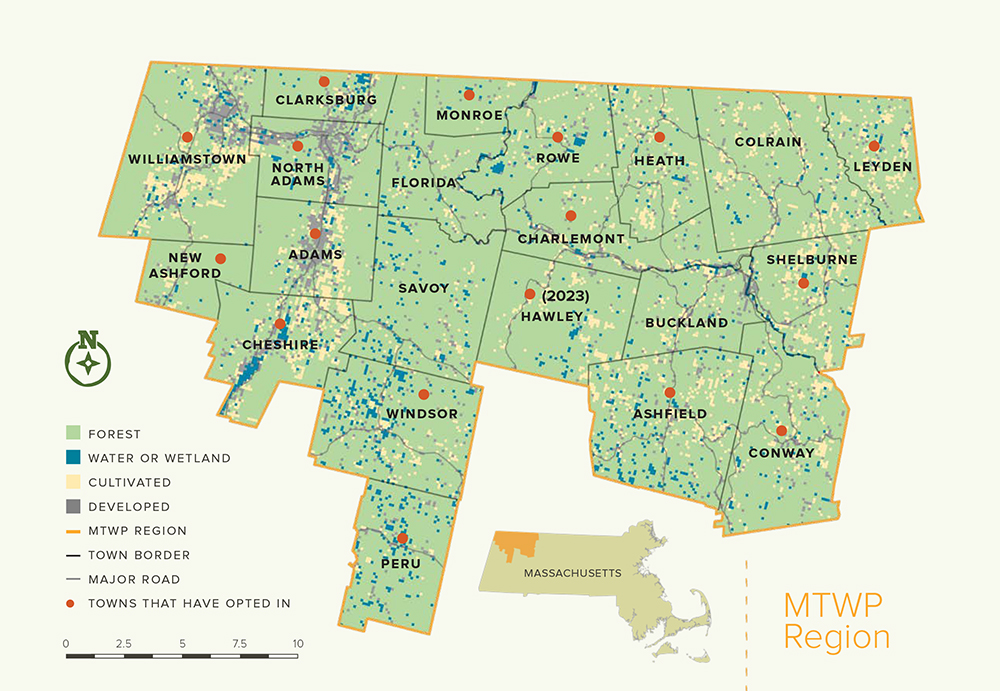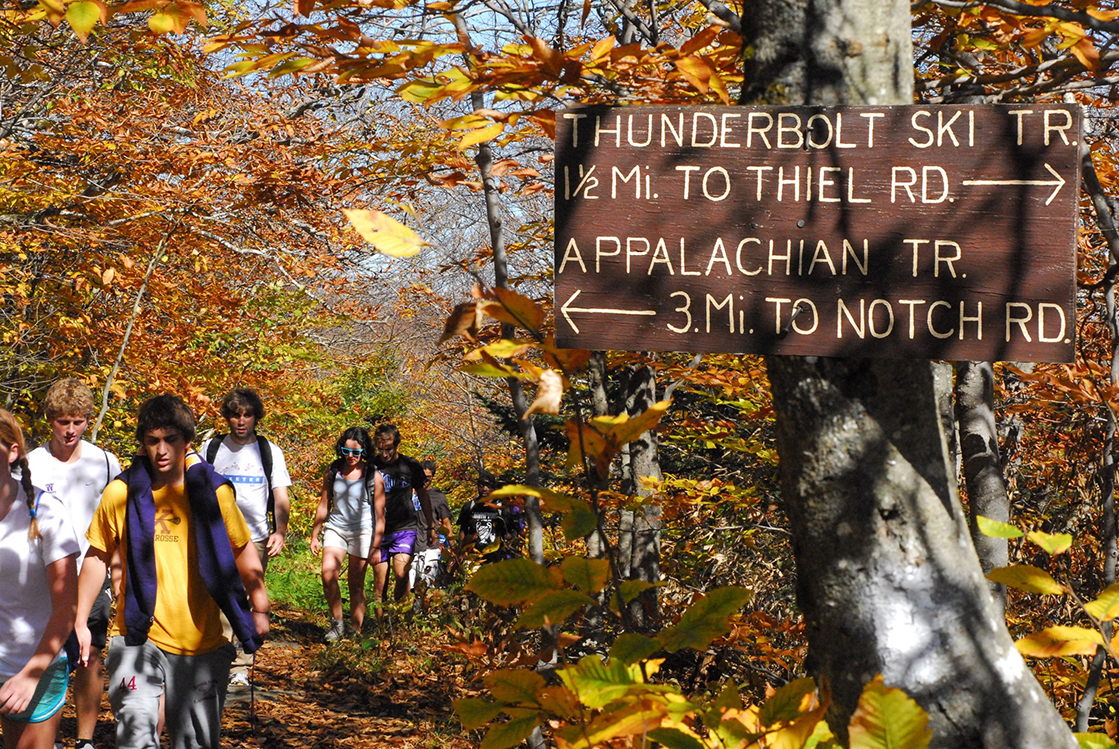NEFF is helping the Mohawk Trail Woodlands Partnership kickstart the local forest-based economy
Writing by NEFF Outreach Manager Lisa Hayden.
Forests blanket the Northern Berkshire Mountains and rolling foothills, where the Hoosic and Deerfield Rivers wind their way down slopes and across valleys, enriching the soil for crops. For millennia, Indigenous Peoples inhabited these hills, traversing hunting grounds and fishing from the rivers. Later, newcomers settled on farms and in villages, often along the river banks, where the force of the water was harnessed to power mills and factories. Following an east-west foot path made by Indigenous Peoples, the Route 2 scenic highway was built in 1914 and dubbed “The Mohawk Trail,” becoming a popular motor tour route in the 1950s.
More than 80 percent forested, this landscape is home to a new model of regional collaboration that could be called “tree-roots to tree-tops,” for it spans many limbs of civil society.
The Mohawk Trail Woodlands Partnership (MTWP) was organized a decade ago by local leaders with support from county planners, regional non-profits, academic partners, and state and U.S. Forest Service officials. NEFF began serving as Administrative Agent for the Partnership in 2021 through a four-year contract with the Massachusetts Executive Office of Energy and Environmental Affairs (EOEEA); this entails coordinating public meetings, managing MTWP Board priorities, supporting fundraising and administering grant activities.
The fledgling Partnership is now working to invite diverse stakeholders to the table, including local tribal organizations, community development agencies, and the owners of family farms and woodlots, to comment on an updated Partnership Plan for the next 10 years.
“We’re trying to revitalize the forest-based economy of the region in a sustainable fashion,” sums up Board Chair Henry W. Art, the Williamstown representative.
Passage of a 2018 Massachusetts law created the Woodlands Partnership as a public body, and to date, 17 of 21 eligible towns have voted to join. A 31-member Board began meeting in 2020 (two U.S. Forest Service representatives are non-voting), picking up the work of an earlier Advisory Committee. NEFF has supported the Board in activating committees on forest conservation; economic development; municipal stability, outreach and education; and finance.

Mohawk Trail Woodlands Partnership Region. Map by Sophie Argetsinger, NEFF MTWP Assistant
The Partnership reached an important milestone in November 2019 when leaders of MA EOEEA and the U.S. Forest Service signed a Shared Stewardship Framework pledging cooperation on outreach and education to Partnership communities, research and demonstration of “exemplary sustainable forest management practices,” and technical assistance related to local recreation and tourism. The vision was to create a model of state and federal stewardship of a forested landscape—without designation of a national forest, as there was local opposition to federal ownership.
The region’s rural municipalities face challenges of limited tax bases, as many are already host to large areas of state forest land. The regional economy has struggled, partly due to closing paper mills and sawmills. Town leaders say many young people do not stay local because there are few jobs. One non-profit with a seat on the Board, Lever Inc., has won state grants focused on job creation by funding entrepreneurial competitions, with the benefit of assistance, among locally owned businesses.
Chair Art notes that the Northern Berkshire County/Western Franklin County location of the Partnership is well-suited to host demonstration forestry projects because of the convergence of several economically important forest types common from the Canadian border to the Mid-Atlantic states.
The geography “coupled with the varied topography and relief conspire to produce a diversity of forest types from montane, boreal forests dominated by Red Spruce and Balsam Fir at elevations above 2,000 feet, to Northern Hardwood forests dominated by Sugar Maple, American Beech, and Yellow Birch on moist, north- and east-facing sites at lower elevations, as well as Oak-Hickory forests dominating on south and west-facing slopes and ridges,” said Art. “Over a distance of but a few miles, one can encounter forest types typical of environments hundreds of miles away.”
The forests of Western Massachusetts are also recognized for storing large amounts of carbon, underscoring the need for Exemplary, climate-resilient and ecologically based forestry in order to carefully steward this landscape and the benefits it provides. Climate change has been an early focus of the Partnership, as its impacts become apparent: severe weather, more frequent floods, droughts and forest health threats from pests and invasive plants that thrive with warmer temperatures. NEFF worked with Mass Audubon, the Massachusetts Department of Conservation and Recreation and many other partners, to launch a pilot Forest Climate Resilience Program in the MTWP region, resulting in grants to a half dozen municipalities to receive climate-smart forest stewardship plans for town-owned properties.
Art says the Woodlands Partnership “is really a team effort between a lot of people with real passion,” for the sustainable use and protection of forests, coupled with rural economic development. He continued, “they are emotionally invested and committed enough to put up with ambiguity,” that can accompany volunteer collaborations and hang in there until sustainable funding for the regional entity can be secured.
NEFF, which also owns nine Community Forests in the region, is excited to support the closely aligned mission of the Woodlands Partnership as it takes root and extends its branches into the clear mountain air.
Learn more at mohawktrailwoodlandspartnership.org
First Chair Leads Partnership Board Toward Sustainable Vision

Williams College students in Williamstown participate in “Mountain Day,” an annual tradition dating back to the 19th century, when classes are canceled on a warm October Friday so everyone can go for a hike. Photo by H. W. Art.
Henry W. Art has brought his perspective as emeritus college professor to his role as the first Board Chair of the Mohawk Trail Woodlands Partnership. So far, he has recruited three different student teams to apply their intellectual energy and research skills to projects designed to advance goals of this regional consortium.
In fall 2021, two Williams College students interviewed stakeholders and explored potential sites and uses for a Forest Center as a flagship community and education resource for this heavily forested corner of the Commonwealth. This spring, three Conway School of Landscape Design students identified riparian restoration sites appropriate for climate-adapted tree-planting in the Deerfield River watershed. And this summer, students from Williams, and Massachusetts College of Liberal Arts, will study how much waste wood is produced from towns and utilities in the 21-town region, and how it might be better utilized.
Partnering with academic institutions benefits both the Woodlands Partnership, and provides real-life learning opportunities for the students. “It’s been an absolute joy to interact with the students,” says Art.
One of the goals in forming the Partnership was to relieve burdens on Northwest Massachusetts towns, and to avoid any costs for their participation. “I think we’ve lived up to that promise,” said Art, noting both the investment of $1 million in state grants over the past three years, and the synergy of bringing together so many non-profits and agencies for common purpose.
The Robert F. Rosenburg Professor of Environmental Studies & Biology at Williams College from 1970 to 2020, Art started to teach right out of graduate school at Yale University. “We feel the Northern Berkshires and Williamstown are really home,” said Art, who also serves with his local Conservation Commission and land trust. “I’ve lived here two-thirds of my life or more… I came here at the age of 26 and this is really home.”
Top photo: A view down Northwest Hill Road, Williamstown, MA, where a Sugar Maple hedgerow lines this scenic road in Hopkins Memorial Forest, formerly monitored by USFS and now by Williams College.


